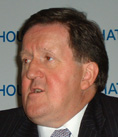Bush's Optimism about Iraq Justified
Lord Robertson of Port Ellen (Former Secretary General of NATO and Chairman of the North Atlantic Council 1999-2003)
and J. Sean Curtin (GLOCOM, Fellow and Asia Times)

Sean Curtin: Do you think President Bush has been too optimistic in his assessment of the Iraq conflict?
Lord Robertson: Iraq is, of course, not going very well at the moment, but the insurgency is not the whole of the people. The optimism of President Bush, and of others, is not misplaced. The vast majority of people in Iraq have no interest in the insurgency. It may be that there are some resentments there, but I am quite sure that most people welcome the fact that Saddam is no longer there. Just as it was in Northern Ireland, a very small number of people using violence can dominate the headlines, making life miserable for everybody. I think there are enough stakeholders in Iraq with a stake in peace, stability and democracy and they will eventually triumph. But there are those who want to create chaos and wreckage.
Sidney Narbarov: Are you optimistic or pessimistic regarding Iran? You know better than me that Iran is very close to producing nuclear weapons and they may be supporting the insurgent forces in Iraq. I am asking this question as someone who comes from the region. I am from Azerbaijan.
Lord Robertson: I think Iran is posing a serious problem at the moment and the distraction of other things means that not enough attention is being focused upon it. I think the European Union has played a big part in getting the Iranians to recognize that they should become more part of the solution than part of the problem. I think it is probably one of those issues that may well have to wait until the outcome of the November presidential election in America is resolved. This probably also applies to the Israeli-Palestine conflict. These are issues that in an election do not allow the flexibility of thought, and of action, that would be required [to solve them]. So, whether we have a new President or an incumbent, who is in his second and final term, I think the chemistry is going to change after that election.
Iran has got to understand that its nuclear weapon ambitions are not acceptable. Colonel Gaddafi has accepted that and I think eventually the North Koreans will accept that and the Iranians have got to recognize that as well.
It is interesting that when we [NATO] took over the international force in Afghanistan, I went around to everybody before we took the decision to do that to check people were happy we would take it over. I talked to President Putin. I spoke to President Musharraf of Pakistan about it. I spoke to all of the central Asian presidents. I even spoke to the Chinese. And at that time the Iranians were interested as well. There were no objections. Everyone said Afghanistan's stability is our priority and we don't care if it is a UN flag or a NATO flag. We want stability in Afghanistan. It was a remarkable experience to find right across from the United States to Russia to China, [people] saying that NATO is the only organization that can do that. I think the Iranians were reaching out at that point and we have to reach out to them.
The above comments were made at the Royal Institute of International Affairs in London on 15 September 2004
Profile: The Rt. Hon. Lord Robertson of Port Ellen
The Right Honourable Lord Robertson of Port Ellen was the 10th Secretary General of NATO and Chairman of the North Atlantic Council from 1999 to 2003. Before that he was Defence Secretary of the United Kingdom from 1997-1999 and Member of Parliament for Hamilton and Hamilton South from 1978-1999.
For seven years he served on the Council of the Royal Institute of International Affairs and has also served as its Joint President.
Related Articles
Is the Iraq Conflict still Polarizing World Politics?
Europe Report #98, 23 July 2004
Insider's Assessment of Iraq's New Interim Prime Minister and President
Europe Report #96, 30 June 2004
Italian Foreign Minister Looks to Iraq's Future, not Past Divisions
J. Sean Curtin, Europe Report #95, 22 June 2004
Impact of American Middle East Policy on Iran and Iraq
J. Sean Curtin, Europe Report #86, 18 May 2004
| 




